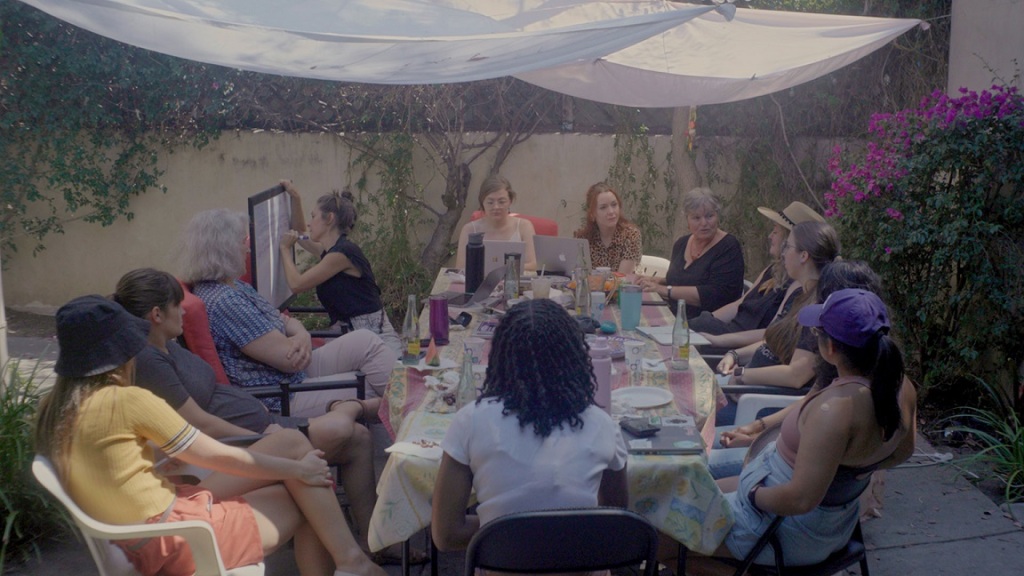
Plan C
Sundance Film Festival Premieres Section
Reviewed for FilmFactual.com by Abe Friedtanzer
Director: Tracy Droz Tragos
Writer: Tracy Droz Tragos
Screened at: Park City, UT, 1/28/23
Opens: January 23rd (World Premiere)
The repeal of Roe v. Wade has understandably caused chaos for abortion providers and made the termination of a pregnancy all the more difficult in the United States. But even before that, there were considerable obstacles to education about abortion options, particularly the Plan C pill marketed as a “safe, at-home abortion.” Incongruent laws and policies across state lines has made it difficult to properly and effectively share the information necessary to provide people with their options, and the documentary Plan C takes a close, poignant look at the benefits, the risks, and the people putting everything they have into ensuring the availability of these pills to anyone who needs them.
At the center of Plan C, both the film and the organization, are co-founders Francine Coeytaux and Elisa Wells. They work with others all around the country to make sure that supply of the pills remains accessible and that there is a way for people to get the information about its existence. The onslaught of the COVID-19 pandemic provides an unexpected opportunity with the temporary authorization of the online mailings of Plan C pills, but the advent of new laws and the repeal of Roe v. Wade threaten to complicate everything, putting those who work and volunteer at risk of prosecution and jail time.
There is an extremely effective and powerful montage early on in the film that shows exterior shots of houses with audio of many people who express how valuable Plan C is and the importance of others knowing about it. While there are those who feel comfortable showing their faces, there are even more who don’t want to be seen, and who know that they might face retribution or legal ramifications for identifying themselves. The concept of private citizen surveillance in a state like Texas, where anyone can report and sue someone else for aiding in getting an abortion, is an additional and legitimate fear tactic that dissuades people from even trying to find the resources they so desperately need.
It’s inspiring to see the creativity that Coeytaux, Wells, and those who work with them utilize to operate mostly within the law but to take advantage of any flexibility they can. One caller is told that she must physically be in neighboring states Montana or Minnesota to even discuss this, and that other women often simply drive over the border to have the conversation. They put messages about Plan C on bubble gum and leave cards near changing tables and bibles, and hire a truck to drive order with a bright, glowing message advertising Plan C’s website, hoping that it will reach a wide audience even if it eventually isn’t permitted to drive around anymore.
This is a difficult issue, and there are plenty of serious setbacks that threaten to counteract any sincere progress. Among the challenges is the issue of intersectionality, where Plan C organizers are cast as white saviors and the very real history of abortion legislation and its relation to race is explored. The concept that abortion wasn’t widely opposed when it was considered something only Black women were doing and that even Ronald Reagan and Prescott Push, father of President George H.W. Bush, endorsed with the latter’s membership on the board of Planned Parenthood, initially supported it, is disturbing and eye-opening. That a lack of abortion access disproportionately affects communities of color should surprise no one, or at least no one open enough to even screen this documentary.
There is a great deal of information provided in this film, much of which has surely already changed since filming and will continue to do so ahead of its eventual release. But its most crucial message is that the spread of knowledge is key, and, even if people choose not to use this pill, knowing about it gives them options (one woman interviewed orders a supply just in case because she knows she’s sexually active and doesn’t want to be left unprepared for any situation). Plan C ends on a hopeful note, which stresses that those who work tirelessly to support and assist others in obtaining safe abortion pills will continue to do so no matter what laws are passed and what individuals are arrested. That optimism is just as critical, since fighting against a broken system can be demoralizing, and the knowledge that there are other committed people out there is unifying and affirming.
102 minutes
Story: B+
Technical: B+
Overall: B+
